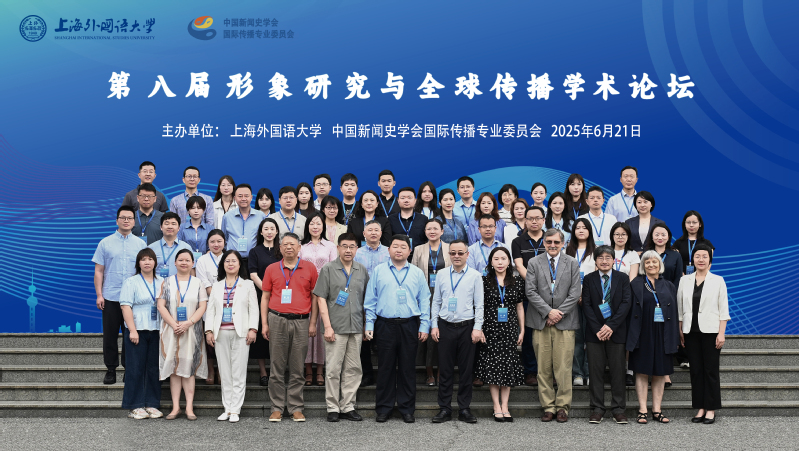
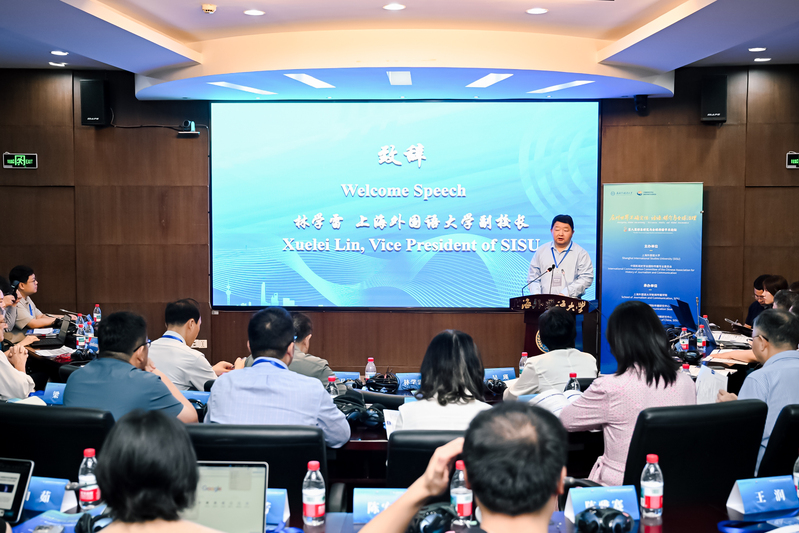
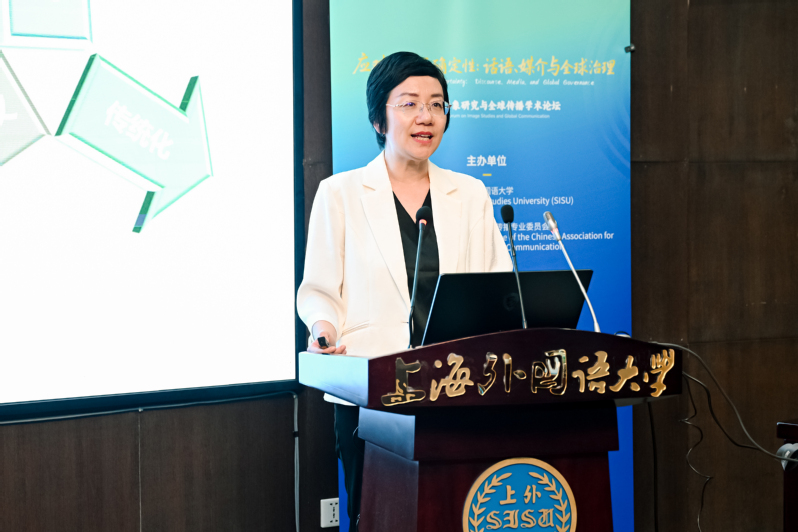
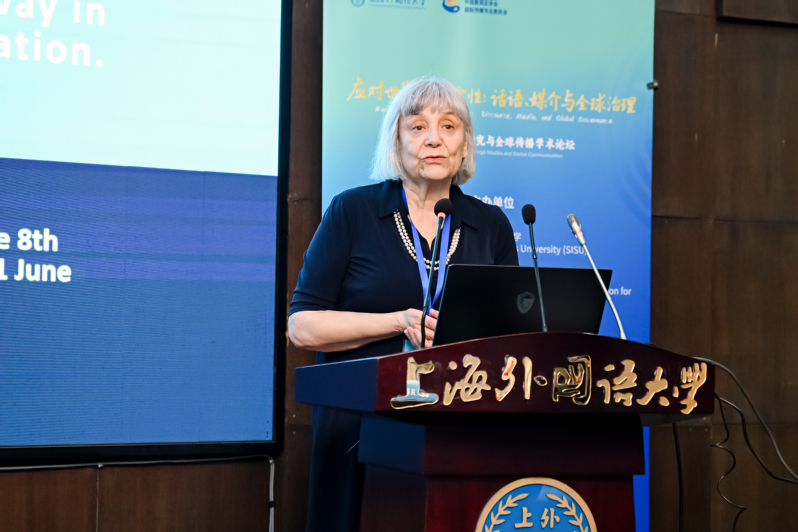
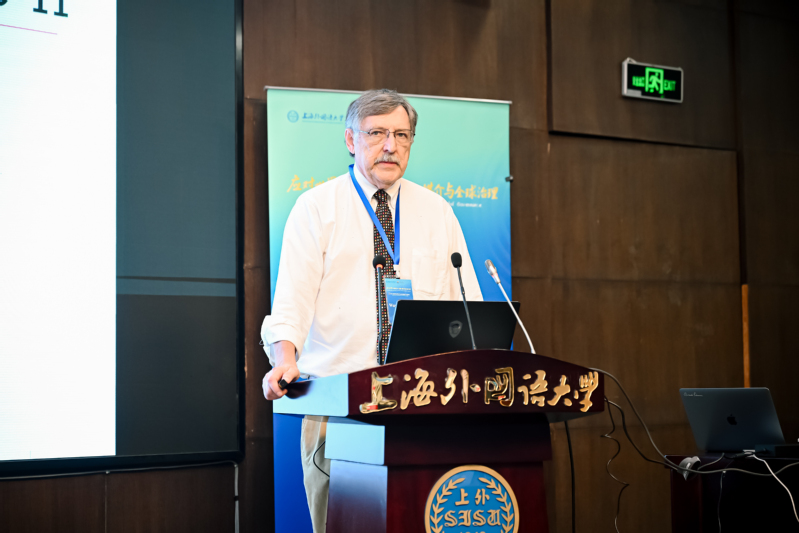
By Wu Wenjing, Li jiayin, Huang Hongsheng, Chen Buran, Shen Yuyan, Wang Yuan, Wang Yuhao, Zhou Hui, Liang Xin, Hu Qiongwen, Wang Huanran
Translated by Guo Yishun
The 8th Forum on Image Studies and Global Communication was held at Shanghai International Studies University (SISU) on June 21, bringing together over 80 scholars and media professionals from China, the United States, Italy, Japan, Singapore, and other countries. With the theme “Navigating Global Uncertainty: Discourse, Media, and Global Governance,” the forum addressed the urgent challenges of global communication amid geopolitical shifts, digital disruption, and evolving public discourse.
Jointly organized by SISU and the International Communication Committee of the Chinese Association for History of Journalism and Communication, and co-hosted by SISU’s School of Journalism and Communication, the Center for Global Public Opinion of China, the Center for International Communication Studies, and the journal Online Media and Global Communication, the event welcomed participants from academia, government, and media sectors. SISU Vice President Lin Xuelei, Sun Weixing (Director, Joint Office of Departments and Schools, Publicity Department of the CPC Shanghai Committee), and Sunjian (head of SISU’s planning office) attended the opening ceremony chaired by Fan Juan, Party Secretary of the School of Journalism and Communication.
In his opening speech, Lin Xuelei emphasized that today’s global uncertainty—driven by intensifying geopolitical tensions and rapid technological change—demands more responsive and inclusive global communication systems. He called for the media to play both a foundational and strategic role in shaping national images and fostering global dialogue. Dean Wu Ying highlighted the significance of the forum in advancing scholarship and practical understanding in the field, pointing to SISU’s four decades of cultivating international-minded communicators through rigorous and interdisciplinary training.
A morning keynote session chaired by Associate Dean Yan Yining brought together ten leading scholars to explore topics including media narratives, image construction, digital sovereignty, and geopolitical rivalry.
Professor Wayne Wanta of the University of Florida examined the fragmentation of U.S. political communication during the Trump era, noting the rise of misinformation and declining trust. Professor Leopoldina Fortunati of the University of Udine called for interdisciplinary cooperation to counter the narrowing of knowledge and the dominance of capital in media. Professor Zhang Taofu from Fudan University discussed cognitive competition in global narratives and China’s strategic positioning.
Zhang Kun from Minzu University of China explored the influence of global public opinion on international relations and proposed methods to improve communication effectiveness. Wu Yun from Tongji University examined the construction of China’s technological image, identifying narrative, language, and media as central to its international communication. Takai Jiro from Nagoya University reflected on how uncertainty can lead to irrational social behavior and stressed the importance of media literacy and critical thinking.
Zhao Yonghua from Renmin University of China analyzed China’s structural limitations in discourse power and proposed a model for institutional discourse construction involving legitimacy, relationships, content, and platforms. Mao Zhanwen from Minzu University of China examined the shifting dynamics of the so-called information empire toward the Global South, advocating for decentralized cooperation frameworks. Jiang Shaohai from the National University of Singapore shared policy experiences in managing population aging, promoting inclusive and coordinated approaches.
Dean Wu Ying also presented research on the representation of Chinese modernization in the Arab world, noting the lack of polyphonic discourse in social media discussions and calling for content, subject, and platform-oriented improvements in communication strategies.
In the afternoon, a high-level roundtable on “Local Innovations in International Communication” gathered leaders from regional international communication centers across China. The session, chaired by Lei Weizhen of Renmin University, focused on how local media can strengthen their international voice through content innovation, cross-cultural storytelling, and the creation of globally recognizable communication brands. Participants emphasized the importance of adapting narratives to international audiences, increasing the visibility of regional voices, and building sustainable communication frameworks within the global media ecosystem.
Six thematic panels were held during the forum, each addressing key aspects of global communication. One panel, focused on national image and the practice of international communication, explored topics such as the media representation of Chinese mythology, the modernization of traditional culture, ecological civilization narratives, and China’s engagement with African nations. Scholars examined how such narratives shape international perceptions of China and the Global South.
Another panel, examining global communication platforms and multicultural interaction, looked at audience emotions, digital intimacy, and the influence of algorithmic governance. Scholars analyzed how platforms mediate identity and cultural exchange in the age of AI-generated content, emphasizing the need for inclusive and ethical media design.
A third panel on area studies and global governance discussed communication in the context of the Belt and Road Initiative, digital migration, and shifting North-South ideologies. Presentations reflected on how strategic communication can influence international cooperation and reshape global power dynamics.
In the panel on digital narratives in cross-cultural contexts, speakers addressed the transnational appeal of virtual idols, storytelling techniques used to promote traditional culture, and third-culture identities emerging through social platforms. Researchers emphasized the role of digital content in forging new forms of intercultural understanding.
A session on film narrative, emotion, and communication analyzed gender discourse, cultural symbols, emotional energy, and narrative styles in contemporary cinema. The discussions highlighted how film serves as a powerful medium for expressing and negotiating cultural identity.
The final session, audiovisual culture and media resonance, explored fan communities, romantic tropes in costume dramas, historical television narratives, and the cross-cultural expression of Chinese international students. Presenters demonstrated how audiovisual media fosters resonance and connection across different audiences and cultural settings.
Against the backdrop of global transformation, the forum served not only as a platform for scholarly exchange but also as a collective response to rising uncertainty in international discourse. By gathering diverse voices and perspectives, the event reinforced the importance of interdisciplinary collaboration, regional innovation, and inclusive storytelling in building a more resilient and equitable global communication landscape.


 |Hongkou Campus|550 Dalian Road (W), Shanghai 200083, China |Songjiang Campus|1550 Wenxiang Road, Shanghai 201620, China
|Hongkou Campus|550 Dalian Road (W), Shanghai 200083, China |Songjiang Campus|1550 Wenxiang Road, Shanghai 201620, China